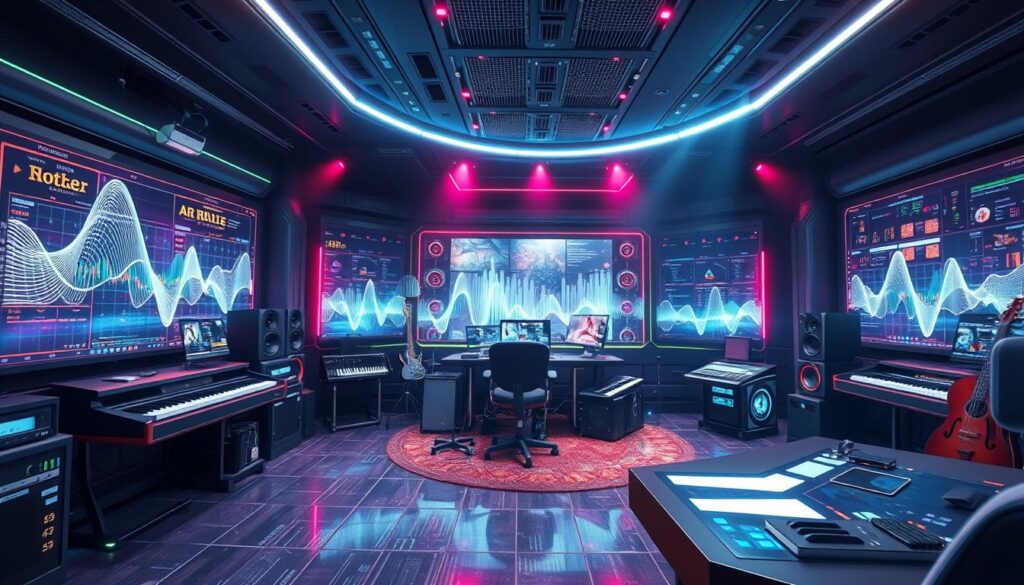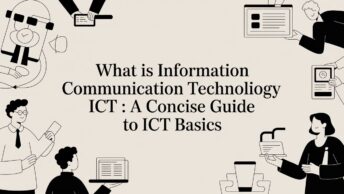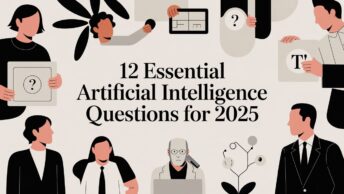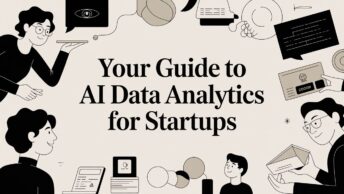In an era where AI’s reach peaks in the music scene, a digital renaissance reshapes classic tunes. New AI tools offer artists and producers a blend of tech and melody, envisaging a future made by both machines and musicians. This partnership makes AI the unseen band member, enhancing creativity with precision and algorithms. Musicians see the value in teaming up with AI for music making. Here, AI isn’t just a tool but a muse and innovator in crafting melodies.
The rise of AI composers sparks debates on their impact on music’s soul and creators. Platforms like Amper Music and AIVA prove AI’s capability in crafting music, stretching its role beyond background noise. As musical innovation climbs, AI-driven music marketing campaigns aim to catch the attention of musicians, tech fans, and producers alike. AI is now seen as a collaborator in music, enhancing artistic expression instead of suppressing it.
AI tools use machine learning to create music, from simple tunes to full songs, based on large datasets. Yet, AI can’t fully understand the human emotions and experiences tied to music making. Technology is making music production accessible worldwide. It lets creators record, produce, and share music easily and cheaply. Plus, streaming platforms help artists reach a global audience.
The merging of AI with music presents both challenges and chances. PRS for Music outlines AI principles to keep its use ethical and safeguard creativity. And copyright law must adapt to protect rights in this evolving digital music world.
Unveiling AI’s Symphony in Modern Melodies
Artificial Intelligence (AI) is changing how we make and produce music in a big way. It brings to life generative music and algorithmic composition, boosted by AI. These tools can go through huge amounts of data. They create complex tunes, starting a new chapter in music where art meets high-tech.
The Rise of Generative Music and Algorithmic Composition
AI looks at lots of data to make new chord progressions and tunes that might not be found in traditional music-making. This lets AI musicians try out new ways to create songs. This is pushing music production to new heights. For example, Amper Music uses AI to suggest fresh chord structures and sound pieces. This helps make music more creative and pushes the limits of genres.
AI Composers: Redefining Music Production with Creative AI
AI composers are changing not just how we make music but also how it’s produced. MuseNet, for example, can make tunes that remind you of Beethoven and Bach. It uses deep learning to change music production based on how the audience reacts. They also help sound engineers by suggesting better EQ settings, compression levels, and more. This gives sound engineers tools they never had before. Advanced AI marketing strategies show how these fresh creative steps fit with market trends and listener interest. This confirms AI’s big part in creative music making.
Harmonising Technology and Tradition in Music
In the music world today, a fascinating blend is happening. AI and traditional tunes are mixing, creating special sounds. Tools like Aiva.ai give artists new ways to craft songs, with complex chords and lovely melodies. This blend shows us AI can boost creativity and keep the real spirit of music alive.
AI is changing how music is made, making tasks easier from labeling to perfecting songs. It’s not just about simplifying work. It’s also about knowing what listeners want. With data, musicians can reach their fans better, making every song feel special.
AI is making music more personal too. It can make custom playlists and even virtual gigs that touch fans’ hearts. And, AI is becoming a helpful partner in creativity, growing to fit each artist’s style.
Yet, using AI in music has its issues. There are big worries like copyright problems with AI-made tunes and fair pay for artists. But even with these issues, the idea is that AI isn’t replacing artists. It’s here to help, taking music to places we’ve never seen before.
Decoding the Language of Sound: AI’s Role in Sound Design
AI-driven virtual instruments are changing sound design, starting a new era of sonic innovation. They are transforming how we make music traditionally. These tools are amazing because they can copy sounds we know and make brand new ones. IBM’s Watson Beat shows how AI can make music making open to everyone in many genres and styles. A surprising 38% of APRA AMCOS members now use AI in making music, with 5% using it often.
AI is really popular with people who make electronic and dance music. They make up 56% of the people using these technologies. This is also true for those creating library music and music for video games and adverts. This widespread use highlights how important AI and sound design are in these fields. They help create spaces where creativity and technology meet.
The future of AI in sound design has both challenges and chances for growth. It might lead to revenue losses for music creators in Australia and New Zealand. They could lose up to AU$519 million from 2024 to 2028 because of AI. However, it also offers new ways to be creative. Developers and musicians are diving into these opportunities, like OpenAI’s Jukebox. This tool can create music that sounds like different genres and artist styles. It shows both the disruptive and helpful sides of AI in music making.
Also, there are big ethical issues about AI in music, especially about copyright. An overwhelming 95% of people think copyright owners should agree before their works are used by AI. As AI shapes the future of music, these discussions are key. They help keep a balance between new technology and the rights of creators.
Behind the Scenes: How Neural Networks Are Composing Music
The integration of neural networks into music composition marks a significant AI milestone in the arts. These networks, especially recurrent neural networks (RNNs) and long short-term memory (LSTM) networks, excel in making complex and emotional music with little human help.
In AI music composition, machine learning models analyze vast amounts of music data. This analysis is crucial for understanding patterns and making rich, intricate compositions. Moreover, this fusion of technology and music brings a new dimension to musical creativity, enhancing rather than replacing traditional methods.
Platforms like Amper Music, AIVA, Google’s Magenta, and Jukedeck use machine learning to transform music making. They make it easier for a wider range of creators to produce music, regardless of their musical training. AI also offers customisation, creating music and playlists that fit individual tastes and moods, making every listening session unique.
AI is making waves in live performances too. It adapts in real time to the audience or the performers, adding a new layer of interaction. This brings an unmatched energy to live shows, thrilling both artists and spectators.
In education, AI tools are revolutionising music learning. They help with music theory and give immediate feedback, suiting each learner’s speed and style. This shows how broad machine learning’s role is in music, reaching beyond creating and performing to include education.
Looking ahead, the cooperation between AI and musicians is bound to grow, bringing novel innovations. This progression suggests a future where AI doesn’t just accompany but boosts the human touch in music creation.
AI in Music Composition
Artificial intelligence in the music industry marks a major change. Now, we can make, produce, and enjoy music differently. AI looks at lots of data and creates new tunes. This mixes technology and art in an exciting way.
Exploring the Partnership Between Machine Learning and Musical Creativity
Machine learning has changed music. It lets us create songs that mix different styles from across the world. The Illiac Suite in 1957 was just the start. Now, projects like OpenAI’s MuseNet and Google’s Magenta use AI to make all kinds of music.
Digital Maestros: The Advent of AI-driven Music Arrangement
AI has changed how we make music. It helps musicians try new things. AI looks at songs to suggest changes, improving how they sound. AI also takes over boring jobs like mixing, so musicians can focus on being creative.
AI is working closely with artists. It’s making music more personal and touching. This partnership will give us a richer and more varied music world. It will connect with us more deeply.
AI’s Crescendo in the Music Industry
AI is leaving a strong mark on the music industry, bringing innovation and custom experiences. It’s changing how we make and listen to music, offering better sound and new ways for fans to interact. This shows a big change in both music production and how we enjoy tunes.
Sonic Disruption: AI in Music Production and Consumption
AI has become a key player in making music, giving creators new tools to shape tunes. Tools like Amper Music’s Songwriter and AIVA are changing how melodies and lyrics are created. These AI tools analyze lots of music to spot new trends, helping make smart production choices. They’ve even brought The Beatles’ songs back to life by isolating John Lennon’s voice with AI.
When it comes to listening, streaming services are leading with AI. Spotify and Apple Music use it to suggest songs that match what you like, making music more personal.
Fan Engagement: AI-Enhanced Music Experiences
AI is also making fans’ experiences more exciting with virtual reality. Artists like Travis Scott have had huge virtual shows, drawing millions online. At live events, AI helps make the sound and visuals better, reacting to the crowd in real-time.
But AI’s role doesn’t stop at music creation. It’s also creating interactive fan experiences that could change concert visuals and playlists to suit the audience’s mood. This interaction builds deeper connections with fans and introduces new ways to blend technology and art.
Intellectual Tunes: AI, Copyright, and the Future of Ownership
AI is stirring up the music scene, leading us into a new creative age. This shift uncovers deep debates about AI, copyright, and ethics in music. The spotlight on these issues grew after a report on the music streaming economy in the UK1-K-K-K>. Amid talks, the UK saw no law changes for AI-made work ownership, leaving uncertainty in the air
New tech like deepfake vocal synthesisers introduces fresh copyright worries. They create voices so real they blur copyright lines1-K-K-K>. The real struggle is defining who owns music made by AI. Legal rules lag as coders, machines, and artists seek rights2-K-K-K>. In this AI-fueled era, clear music licensing deals are more vital than ever
In places like the UK, who makes the music decides who owns it. This creates a maze of copyright and ownership questions1-K-K-K>. This debate isn’t just about laws. It’s also about using AI in music fairly and transparently, shaping the future rights landscape
Understanding these challenges deeply matters. AI’s role in music composition raises big questions. Looking ahead, the industry needs to balance innovation with copyright respect. This ensures AI and artistic truth work together in harmony.
Reverberating Through Genres: AI’s Broad Scope in Music
The way Artificial Intelligence shapes music is growing fast. It moves beyond the usual music genres. It brings to life new and exciting sounds. AI changes how we think about music, making once complex tasks simple in making tunes. These smart AI systems look at lots of music from the past. They even understand music theory to create new, pleasant chord sequences.
David Cope was a trailblazer with his Experiments in Musical Intelligence. It could craft new pieces in the style of famed classical musicians. Then, there’s Google’s Magenta project which mixes AI and human creativity to make fresh tunes. AI is now a big part of making music. It helps in many ways – from coming up with melodies to producing complete tracks. It’s changing the traditional ways we make music.
Lately, AI has become very skilled in making music. It can mix sounds in a way that captures the artist’s unique style. Amazingly, some AI models have echoed classical music, like Bach’s work. This shows how well AI can grasp and recreate complex artistic moods. But AI’s role isn’t just in making music. It also makes music more touching for listeners, using advanced tech like IBM’s Watson Beat to create tunes that really speak to our emotions.
In 2023, AI reached new heights in music. Songs like Drake Ai’s “Heart On My Sleeve” and Taryn Southern’s “Break Free” show how important AI has become. AIVA went even further by composing a whole album on its own. This marks the start of a new era. Now, AI is a key player in the creative process, not just a helper.
The Ethical Chord: Balancing AI Innovation with Artist Integrity
In the music world, the rise of artificial intelligence (AI) brings exciting new opportunities and big ethical questions. As AI becomes more common in music, people are talking more about its impact. The focus is on empowering artists and finding the right balance between new ideas and keeping true to artists’ values.
Grasping the Reins of AI: Artist Empowerment in the Algorithmic Age
Empowering artists is crucial today, as shown by an open letter from over 200 famous artists and songwriters. They raised concerns about how AI could copy human creativity and weaken true artistic talent. This call to action highlights the need for artists to keep creative control and make sure AI helps, not replaces, their creativity. It’s important that artists keep ownership of their work so they can benefit from their creativity and AI’s possibilities.
The Double-Edged Sword of AI: Addressing the Challenges
The issues with AI in music are complex and require careful thought. The same open letter pointed out how AI could unfairly use artists’ work and hurt their earnings. To innovate responsibly, we need clear rules and systems for fair pay and credit for creators. Also, tech developers and the creative world must work together to make AI tools that are ethical and support both tech and artistic growth.
Now, the music industry must talk openly and tackle these key issues. This is needed for a future where AI responsibly opens up new possibilities, without overshadowing the human creativity at the core of music.
The Sounds of Tomorrow: AI’s Progressive Rhythm in Music Evolution
The world of music is changing fast, thanks to AI. This tech is shaping how songs are made and heard. It boosts streaming services and helps users find new tunes through smart data use. In 2020, streaming made $13.4 billion, a big part of the music industry’s income.
AI changes not just listening habits but also how music is born. Independent artists now avoid big labels, using AI for direct music sharing and earnings. This shift towards indie production and varied income is big news. Also, AI’s innovations echo in today’s progressive rock, tracing back to experimental sounds from the 1960s.
Music education benefits from AI, too. Tools like Yousician offer customized lessons, which is great for learners worldwide. AI also powers music suggestions on platforms like Spotify and Pandora. This has helped boost streaming revenue by 19.9% in 2020.

Bands like ‘Magenta’ mix AI with human talent, creating new kinds of music. This partnership doesn’t just assist but also inspires. It signals AI’s vital role in bringing together tech and creativity. This fusion is crafting the future sounds of music.
Conclusion
The music production world has changed forever with artificial intelligence (AI) playing a big part. It’s exciting to think about how AI is pushing music to new heights. AI isn’t just a temporary trick; it’s making a big, lasting impact on how we create music. Nowadays, AI uses large datasets to spot patterns and insights, like what Soundful does with cutting-edge music making tools.
This tech helps humans and machines work together in harmony. Artificial composers learn different music styles fast and create new tunes quickly.
Some AI tools in music aim to be affordable and easy to use. Others, like Google’s Magenta and OpenAI’s MuseNet, are making complex music suggestions. AI isn’t just for background music; artists like Taryn Southern are using it to make whole albums. But, this new tech brings up questions about who owns the music and how we think about creativity.
Despite these questions, musicians working with AI suggest a future where music goes beyond the old limits. The music world is finding a new beat, combining human creativity with AI. This mix leads to never-before-seen music adventures, opening a world of possibilities for both artists and their fans.
FAQ
How is AI influencing music composition?
AI changes music composition by creating generative music and algorithmic composition. It uses advanced tech like neural networks and learning machines. These help AI composers make new melodies, harmonies, and rhythms. This process gives human artists more creative freedom and pushes the limits of music making.
What is generative music and how does AI contribute to this field?
Generative music is made by systems that algorithmically produce different music each time they play. AI helps by using complex algorithms to make music that can change depending on the setting or interact with humans. This leads to unique and emotionally moving pieces.
Who are some of the key AI composers in the industry?
Important AI composers include AIVA and Amper Music. They use AI to make everything from background scores to full songs. These are used in films, games, and commercials.
How does AI impact sound design?
AI greatly influences sound design with AI-driven tools like IBM’s Watson Beat. These tools help create new and traditional sounds. AI lets sound designers try out new textures and automate sound’s complex parts easily.
What role do neural networks play in music composition?
Neural networks are central to AI music systems. They learn from lots of music data to spot patterns and use them to create new compositions. These networks mimic different music styles, adding variety to AI-made music.
In what ways are machine learning and musical creativity being explored together?
Machine learning and musical creativity are combined to design AI that learns from a vast array of music. Such systems find new patterns and make music that touches the heart. They also help in arranging and producing music, offering new ways for musicians to work with AI.
How is AI reshaping music production and consumption?
AI changes how music is made and enjoyed by offering advanced songwriting and mixing tools. This makes creating music easier. For listeners, AI suggests new music they might like and creates immersive experiences, such as VR concerts.
What are the copyright risks and challenges associated with AI-generated music?
AI-made music brings copyright issues, especially around who owns the music and protecting original works. Questions about licensing and using artist styles without permission arise. There’s a need for laws to manage these issues.
Can AI impact every music genre?
Yes, AI can influence all music types. Its algorithms can create and produce music in many styles. Its versatility lets musicians explore new creative paths, no matter the genre.
What considerations are there for balancing AI innovation with artist integrity?
Balancing AI innovation with artist integrity means using AI to support, not replace, human creativity. It’s about respecting artists’ rights and considering ethical aspects. Open discussions on AI’s use in music and collaboration among industry players are key.
How is AI set to evolve the music industry in the future?
AI will keep transforming the music industry by adding to music creation, production, distribution, and consumption. The partnership between AI and human creativity will likely create new music types and business ways. It encourages everyone in music to embrace AI’s role.
Source Links
- Harmony of the Future: AI’s Role in Music Creation – https://medium.com/@justbrome/harmony-of-the-future-ais-role-in-music-creation-1651b854c179
- How is AI shaping the future of music? | M Magazine – https://www.prsformusic.com/m-magazine/features/how-is-ai-shaping-the-future-of-music
- The Symphony of Progress: AI as an Instrument of Musical Innovation – http://jongriffinmusic.com/symphony-progress-ai-instrument-musical-innovation
- AI in Music Composition: Transforming the Symphony of Creativity – https://medium.com/@EduardoLarranaga/ai-in-music-composition-transforming-the-symphony-of-creativity-e2063c5fc92a
- The Harmony of Music and AI – MyOpenCourt – https://myopencourt.org/the-harmony-of-music-and-ai/
- Harmonizing with AI: The Future of Music – https://susanerwin.com/cyber-sue/blog/harmonizing-with-ai-the-future-of-music
- AI and the Music Industry: Brace for Impact – https://limelight-arts.com.au/news/ai-and-our-music-industry-brace-for-impact/
- Musical Intelligence in AI – GeeksforGeeks – https://www.geeksforgeeks.org/musical-intelligence-in-ai/
- How AI Helps in Music Composition: Revolutionizing Creativity and Production – https://www.evoastra.com/post/how-ai-helps-in-music-composition-revolutionizing-creativity-and-production
- CassetteAI – Behind The Scenes Of AI Music Training: Algorithms Unveiled – https://cassetteai.com/blog/behind-the-scenes-of-ai-music-training-algorithms-unveiled
- AI in Music: Composition, Production, and Recommendation – https://medium.com/@jam.canda/ai-in-music-composition-production-and-recommendation-4b5bbde1b10b
- How Artificial Intelligence is Revolutionizing Music Composition » Flourish$Prosper Music Group – https://flourishprosper.net/music-resources/how-artificial-intelligence-is-revolutionizing-music-composition/
- Orchestrating The Future—AI In The Music Industry – https://www.forbes.com/sites/davidhenkin/2023/12/05/orchestrating-the-future-ai-in-the-music-industry/
- Generative AI’s crescendo in music production – https://timesofindia.indiatimes.com/blogs/a-window-to-the-tech-world/generative-ais-crescendo-in-music-production/
- AI-Generated Music and Copyright | Clifford Chance – https://www.cliffordchance.com/insights/resources/blogs/talking-tech/en/articles/2023/04/ai-generated-music-and-copyright.html
- A.I. Generated Music and Copyright: Navigating the Digital Soundscape – https://www.linkedin.com/pulse/ai-generated-music-copyright-navigating-digital-soundscape
- The Future of Music: How AI Songs are Reshaping the Audio Landscape – https://blog.empress.ac/the-future-of-music-how-ai-songs-are-reshaping-the-audio-landscape-cloyn0171323412rldryg425vz
- The AI Symphony: Harmonizing Technology and Art in Music Creation – https://oluwafemidiakhoa.medium.com/the-ai-symphony-harmonizing-technology-and-art-in-music-creation-de5ed9e0cd38
- The Open Letter That Strikes a Chord: Artists Rally Against AI Music – https://www.linkedin.com/pulse/open-letter-strikes-chord-artists-rally-against-ai-music-ategeka-ekdnc
- Musicians vs. AI – A Stand for Creativity – https://www.linkedin.com/pulse/musicians-vs-ai-stand-creativity-anthony-j-james-sjvvf
- The Tides of Time: Music and AI’s Intertwined Evolution – https://wavv.medium.com/the-tides-of-time-music-and-ais-intertwined-evolution-d8a4ffbbec80
- Create Rock Music with AI – Complete How-to Guide – https://www.soundverse.ai/blog/article/create-rock-music-with-ai
- Can AI Music Composition Replace Human Composition | Soundful – https://soundful.com/can-ai-music-composition-replace-human-composition/
- The Role of AI in Music Composition and Production – https://blog.emb.global/ai-in-music-composition-and-production/
- The Rise of AI-Generated Music: What It Means for Artists » Flourish$Prosper Music Group – https://flourishprosper.net/music-resources/the-rise-of-ai-generated-music-what-it-means-for-artists/
Discover more from Scott Dylan
Subscribe to get the latest posts sent to your email.






